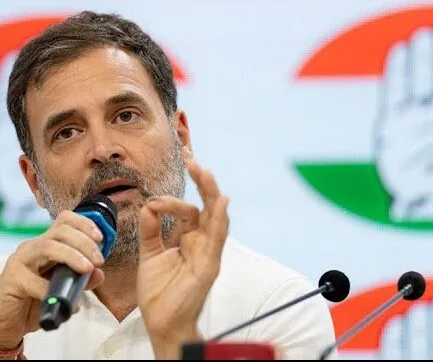Congress defends Gandhi, questioning how upholding the constitution is anti-national
In a heated exchange, BJP leaders criticized Congress leader Rahul Gandhi for his comments on reservation and his meeting with US Congresswoman Ilhan Omar during his visit to the United States. Union Home Minister Amit Shah accused Gandhi of exposing the Congress party’s “anti-reservation” stance and aligning with forces that seek to divide India.
Shah stated that Gandhi’s remarks about abolishing reservations reveal the Congress party’s true intentions. He emphasized that as long as the BJP is in power, reservations will remain intact and national security will be upheld. Shah also condemned Gandhi’s meeting with Ilhan Omar, who has previously been criticized by India for her stance on Kashmir, labelling it as an alignment with anti-India forces.
Defence Minister Rajnath Singh also attacked Gandhi, accusing him of making misleading statements about the India-China border dispute and suggesting that Sikhs feel insecure in India. Singh argued that Gandhi’s claims were unfounded and harmful to national unity.
Embed from Getty ImagesIn response, Congress defended Gandhi, with party leaders questioning how upholding the Constitution and advocating for fair representation could be considered anti-national. They argued that Gandhi’s comments were aimed at highlighting the lack of representation for marginalized communities in the Indian government.
Gandhi’s remarks came during an interaction with students at Georgetown University, where he pointed out the underrepresentation of tribal, Dalit, and OBC communities in the Indian bureaucracy. He stated that reservations would only be reconsidered when India becomes a fair and equitable society.
Union Commerce and Industry Minister Piyush Goyal demanded an apology from Gandhi, claiming that his statements hurt the sentiments of Indian citizens. Union Parliamentary Affairs and Minority Affairs Minister Kiren Rijiju echoed these sentiments, criticizing Gandhi for associating with known anti-India elements.
Analysis
Political
The political implications of this controversy are significant. The BJP’s strong reaction to Gandhi’s comments and his meeting with Ilhan Omar highlights the party’s strategy to portray the Congress as anti-national and out of touch with Indian values. This narrative aims to consolidate the BJP’s support base by emphasizing its commitment to national security and social justice. For the Congress, defending Gandhi’s remarks is crucial to maintaining its stance on social equity and representation, which are key issues for its voter base.
Social
Socially, this controversy underscores the deep divisions within Indian society regarding caste-based reservations. Gandhi’s comments about the lack of representation for marginalized communities resonate with many who feel excluded from the power structures. However, the BJP’s response reflects a significant portion of the population that views reservations as a settled issue and any discussion about their abolition as a threat to social stability.
Racial
The racial undertones of this controversy cannot be ignored. Gandhi’s meeting with Ilhan Omar, a figure who has been critical of India’s policies in Kashmir, adds a layer of complexity to the issue. The BJP’s framing of this meeting as an alignment with anti-India forces taps into nationalist sentiments and racial prejudices, portraying Gandhi as someone who is willing to compromise India’s integrity for political gain.
Gender
Gender dynamics also play a role in this controversy. Gandhi’s emphasis on fair representation includes addressing gender disparities within the Indian bureaucracy. The Congress party’s defence of Gandhi’s remarks can be seen as an attempt to appeal to women voters who are concerned about gender equality and representation in government.
Economical
Economically, the debate over reservations has significant implications. Reservations are seen by many as a tool for economic upliftment of marginalized communities. Gandhi’s comments about the need for a fair and equitable society before reconsidering reservations highlight the economic disparities that still exist in India. The BJP’s defence of the current reservation system underscores its commitment to maintaining economic stability and social justice for these communities.
